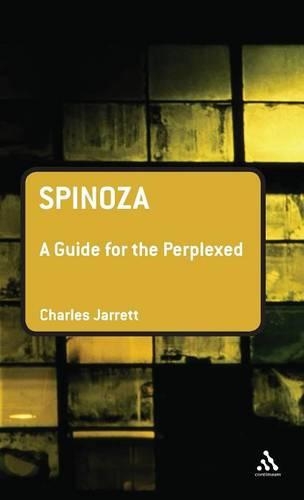
Spinoza: A Guide for the Perplexed
(Hardback)
Available Formats
Publishing Details
Spinoza: A Guide for the Perplexed
By (Author) Professor Charles Jarrett
Bloomsbury Publishing PLC
Continuum International Publishing Group Ltd.
11th June 2007
United Kingdom
Classifications
Tertiary Education
Non Fiction
193
Physical Properties
Hardback
240
Width 138mm, Height 216mm
300g
Description
Continuum's Guides for the Perplexed are clear, concise and accessible introductions to thinkers, writers and subjects that students and readers can find especially challenging. Concentrating specifically on what it is that makes the subject difficult to fathom, these books explain and explore key themes and ideas, guiding the reader towards a thorough understanding of demanding material. Benedict de Spinoza is a major philosopher of enduring influence and importance, whose work is encountered by all serious students of Western philosophy; his Ethics is one of the seminal works of moral, religious and political thought. Nevertheless, Spinoza is a considerable challenge for the modern student; his language, rooted in the vocabulary of late medieval scholasticism is frequently opaque, while the esoteric themes explored in his work often require elucidation. Spinoza: A Guide for the Perplexed provides that elucidation, offering a thorough account and analysis of Spinoza's key works and overall philosophical project. The text equips the reader with the necessary means to draw full and clear understanding from Spinoza's often inaccessible language and complex philosophical system and method. His Ethics and political treatises are covered in detail; Spinoza's 'geometrical' approach to his subject is opened up, and his obscure terminology fully explained. The book concludes with a valuable assessment of Spinoza's enduring influence and his relevance for contemporary philosophical debates and concerns. It is an excellent support resource for anyone trying to get to grips with this challenging and important philosopher.
Reviews
"Jarrett's Spinoza: A Guide for the Perplexed (itself part of a relatively new series from Continuum that aids readers equally perplexed by authors as varied as Theodor Adorno, Gilles Deleuze, Thomas Hobbes, and Ludwig Wittgenstein) introduces the reader briefly to Spinoza's historical background and overall place in modern western philosophy...its main task is to present the reader with a detailed account of Spinoza's major works, including the Treatise on the Emendation of the Intellect (1662), the Tractatus Theologico-Politicus (1670) and the Tractatus Politicus (1675-76), and, of course, his magnum opus, the Ethics (1677)... The perplexed reader who does not even know where to start--or how to recognize important shifts in Spinoza's arguments--will find these detailed treatments particularly illuminating. Even more useful are the sections at the end of each chapter, entitled "Comparison of Spinoza with Others," and "Problems and Disputed Issues of Interpretation."... For the reader set to wade through the Ethics in particular--be that scholar in history, philosophy, literature, or any neighboring field--Jarrett's guide could prove an invaluable tool. In this regard, it assumes that the "perplexed" reader of Spinoza is not the uninitiated, but rather the reader who knows just enough about Spinoza's thought to realize the challenge he/she faces. And for that "perplexed" reader, Jarrett's book will indeed be the welcome guide its title promises." -Tracie Matysik, H-Net Reviews, November 2008
Author Bio
Charles Jarrett is Associate Professor of Philosophy at Rutgers University, New Jersey, USA.
